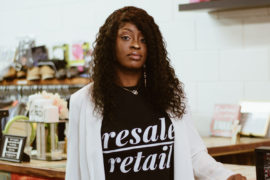Loyalty and empathy are a couple of key characteristics for a leader to have. Newest addition to the Saks Fifth Ave team, General Manager Curtis Spaulding, is a man for the people. A thirty year retail industry veteran, he sees a lot of value in finding one’s passion and motivation. Spaulding is a relatively recent transplant to Indianapolis, and PATTERN wanted to give him a warm welcome to the Midwest fashion community by learning how he fashions himself for success.
Maggie Voss: Where are you from?
Curtis Spaulding: I’m originally from New York City.
MV: How’d you get started in this industry?
CS: I’ve been working with Saks now for about eleven years, out of the Washington D.C., Chevy Chase store where I was the assistant general manager. Then, I came to take over this store and become the general manager back in September. So I’m a Saks Fifth Ave veteran. Before Saks, I worked a few years at Nordstrom. Before Nordstrom, I actually owned my own store. For about five years we had two main stores in Washington D.C.
MV: Wow, that’s a lot of retail.
CS: I’ve always loved clothes. I used to have an older cousin who was hip and always had the latest fashions. His clothes would get handed down to me, but they were a little too big. I would undo the seams and make them fit me. It probably wasn’t the best sewing job, but it was good enough to make me look like the coolest guy in school. When I went to college at the University of Texas, I got an international finance degree. I went into banking for a little while and was never really excited about that. Sitting behind a desk has never been one of my strong points. I have to move around. I have to talk to people. I got into the fashion business kind of on a whim when I started a men’s clothing store with a business partner. I believe you have to be passionate about the things you do. God knows, I’ve never done anything for money. Staying in the financial world wasn’t something that I had to do. I’ve never really been driven by that. I enjoy this because you get an opportunity to create every day. [I get to] work with people, designers, and our buyers in New York to create an environment where people want to come and shop and have fun.
MV: You said you and a partner owned your own business. Can you tell me a little more about that?
CS: In Washington D.C., a former basketball player, Tim Hardaway, and I opened up a clothing store called FORVM (For-um), and it was open for about five years. It was just a small men’s accessories store: shirts, ties, cufflinks, tie pins, and it kind of regenerated and reinvigorated my love for fashion. At that point I made a decision to follow my passion. When that didn’t work out, I went to Nordstrom and then came to Saks.
MV: What do you think owning your own business taught you about yourself?
CS: It taught me that I can be patient and have empathy towards my sales associates and my employees. When you’re an owner, everything falls on you from human resources to insurance. You do all that so you have to have a certain amount of empathy when they clock in late or don’t show up for work. To this day, I still have a lot of patience dealing with people on a day-to-day basis. It also taught me that I can be tough when I need to be. I was able to compartmentalize to figure out what I needed to be in order to be successful. You have to be all things to all people as a business owner.
MV: Do you think you’ve translated the work that you’ve done and the persona that you’ve gained from being a business owner into being a general manager at Saks Fifth Ave?
CS: Yeah, I don’t think you change. You are who you are. Whoever I was as a store owner I bring that to Saks Fifth because that’s who I am. The only thing about it now is I don’t have to buy the inventory. Saks can do all of that. I can still be that same business owner without having the burden of the cost that goes with it. I haven’t changed except getting a few years older.
MV: So what techniques did you teach yourself to show your employees the best way for them to reach their sales goal? Which ones worked and didn’t work?
CS: In the retail business it’s not about the sale. It’s about the customer. The customer is the number one thing you have to consider. When you start really focusing on the sale, you’re going to lose the customer and that credibility. It’s not a technique that I taught myself, but it evolved through figuring out different examples of things that worked and the things that didn’t. Customers come in and don’t know what they want. My favorite saying is from Steve Jobs when he says, ‘Customers don’t know what they want, until you show it to them.’ In coaching and teaching selling managers, I tell them that it’s all about the relationship-base. Do you get a customer in, do you want to let that customer go, or do you want to try and build that relationship to have the customer come back to you? I tell them all the time ‘this is you interviewing to get that customer to come back into the shop.’
MV: That’s a really good perspective to have.
CS: People want to say that department stores and malls are dead. They’re never going to be dead because no matter what people are doing online ultimately when there are issues they always come back to the department store to get them fixed. When that customer is in front of you, no matter what he’s buying, you need to find a way to make them think differently about you as a sales associate and also about Saks Fifth Ave. It’s not about the sale; it’s about how we build the relationship with every interaction that we have.
MV: What do you do for fun? What do you do outside of here?
CS: I would like to get to an IU game or a Pacers game. I enjoy sports. I’ve been here for almost four months now and I really haven’t ventured out as much as I probably would have but I’m trying to get things buttoned up. I’m always doing functions for the store and the company. That’s got me out to different charitable functions and meeting people that way. My first month here we had a huge event – Key to the Cure – with more than 500 people in attendance. I attend a lot of functions on behalf of Saks Fifth Ave. If anything gets me out it’s that.
MV: How do you stay updated on upcoming fashion trends?
CS: When you’re in this industry, it comes to you. I get emails at 3:00 in the morning from Business of Fashion. I keep updated with that. I have a lot of people in this industry who I know. If you’re going to be in this business, you’re always learning. Fashion evolves not even every six months anymore. It’s almost every six days. Your goal every day or every week is to stay up on what’s going on the industry in the store and online. I’m always pulling up whatever I need to read for that morning so then I can share it with the team.
MV: What advice would you give other people who want to join the luxury retail business?
CS: I would say the main thing is to have passion. That’s not only in retail, but in anything you do, you should honestly not do it for the money. Many people, especially millennials, are going to have six to seven jobs in their first two to three years. So you have to find that thing that you’re passionate about. Then go from there. Once you find that, you have to always be looking to evolve. If your passion is selling clothes, you have to evolve as the fashion industry evolves. You’ve got to want to be in it in a deep way.
MV: What’s you’re favorite statement piece that you have in your closet, whether it’s a shoe a watch or a jacket.
CS: I bought a suit from a brand called Isaia. No matter where I wear this gray check, flannel, double breasted suit, I’ve always been stopped. I mean, women, men they all love this suit. I didn’t bring it down with me originally but in November when I went back home, I said, you know this might be a little fast for Indianapolis. But, then I had to tell myself that I can’t think that way because that’s how people here think. That’s exactly the thinking that I want to change. Also, my Tom Ford Black Orchid cologne. I’ll never forget this. I was in a cab in New York city and the cab driver said, “excuse me, I don’t want you to think I’m strange or whatever, but, what is that scent you’re wearing?” That scent to me is more of a statement piece than the suit.
MV: When you come to smaller city like Indianapolis, how do you incorporate such a big company into the community?
CS: This company has been here since 2003. It’s already incorporated but what happens is a lot of different industries evolve. Evolution is not a bad thing. We use the word evolution instead of using the word change because change is a bad thing to some people. So you have to stay on top of what’s going on with the team and they have to be involved. They have to know that they matter. Yes, Saks is a big global company, but everything is local and we can affect things in that way. But, as far as making the store work, that’s all about the people and their relationships. That’s how you bring a big brand to the local level. But, it all starts and ends with the people that are in the building.
MV: Now that you’re here in Indy, what’s next?
CS: Indianapolis… my big thing with my team is that every time we are communicating with New York and they always send an email like ‘what’s going on with Indy?’ I always send an email back saying ‘Indianapolis.’ I want my team to think about that too because we have to think about this as a big city. So it’s Indianapolis. Indy makes the city sound so small and so cute.
MV: Now I won’t be able to say ‘Indy,’ without remembering what you just said! From here on out, it’s Indianapolis.
CS: You’ve got to think broadly like that. It’s starting to pick up in New York. One time I shared in a morning meeting with the people in the store. I named five cities and asked them to put them in order of size. Everyone thought that Indianapolis was going to be the fourth or the fifth biggest city compared to Atlanta, Miami, and Boston. Indy is actually the twelfth biggest city in the United States. I told them after that I don’t want them to think of themselves as a small store. Because if you think that, then buyers in New York will think that way. They’re going to think Indy can’t do this or that, but my goal is to get them to know that Indianapolis can.




